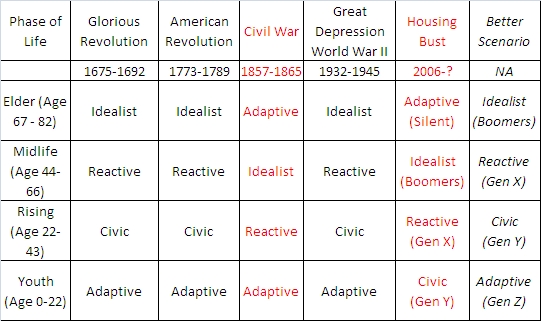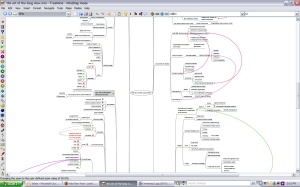Generations and the Economic Crisis
I am currently reading Generations by William Strauss and Neil Howe as part of my book research and the bok, along with a recent post on Modite have really made me think about the current economic crisis.
Strauss and Howe identify a circular pattern of four distinct generations that has repeated in America since 1584; the generations are adaptive, civic, idealist and reactive. In their theory, GIs (b. 1901-1924) are the civics, Silents (b. 1925-1942) are the adaptives, Boomers (b. 1943-1961) are the idealists, and Gen X (b. 1961-1981) are the reactives. Gen Y (b. 1981-2000) are another set of civics.
In their analysis, every 45 or so years the active generations (excluding the very old and very young) experience either a secular or spiritual crisis. Secular crises include the Revolutionary War, the Civil War, Great Depression-World War II. Spiritual crises would include periods like the Sixties or the Transcendentalists of the 1820s.
The final element so far is that each generation passes through a life stage: youth (age 0-21), rising adulthood (age 22-43), midlife (age 44-65) and elder (age 66-87). (I’ll post a chart so this makes more sense).
The authors identify five secular crises that produced sweeping change but only four were met with a sense of victory and the dawn of a new era. These four successful resolutions shared something in common:
- Idealist elders providing principle and vision
- Reactive midlifers that are pragmatic leaders
- Civic rising adults doing their duty
- Adaptive youths following adults and making few demands
The spiritual crises exhibit a different pattern: “the trained order-takers are old while the instinctive order-givers are young. Any collective effort faces strong social obstacles.” This was the same pattern Strauss and Howe found during the Civil War — successful in that it ended the horror of slavery and reunited the US, but could have been resolved with far fewer casualties had it occured 20 years earlier or later.

Many have expressed concern about the merits of Gen Y — for one I am not concerned because they appear to be following a pattern that has existed for 500 years and will likely contribute very much to our society. But if the housing bubble is our next major secular crisis, has it, like the Civil War occurred too early? The accompanying chart suggests that it would be more easily resolved with different leadership –by that I don’t mean someone else instead of Obama — rather if the crisis came with a leadership pattern reflective of the Great Depression/World War II, rather than what we see today from a generational perspective.
I don’t know the answer, but I am interested in your thoughts & comments.
Beating the Recession
Between taxes and writing the book I have not had much time to post in the last few weeks. The book is at 28+ pages so I should start having sections to post soon.
In the interim, I saw the Houston Business Journal has started a Beating the Recession page – with links to articles about different ideas people and companies are implementing to stay ahead of the recession curve.
They also have a “Beating the Recession” group to share other ideas.
One more tool
I was in a hurry last night and left one off the list. If you are not familiar with mind mapping, I would strongly recommend Tony Buzan’s Using Both Sides of Your Brain. If you can’t find the book, there is also a good description here.
Basically it is a technique of planning or notetaking that forces you to put the entire note/plan on one sheet of paper and allows you to more easily see logical connections. The core idea is in the center and new ideas branch out from the core — with the goal to fill each branch with an idea “hook” that will help trigger your memory later when you review it. Also, the map format allows you to draw connections between separate ideas and I have used it on a number of occasions to “connect the dots” on complicated ideas.
There are several sophisticated mind-mapping applications on the market, ranging from $100 – $350 at the moment. These programs have a lot of features and can integrate with Outlook and Project, etc. I have used the demo versions of a couple of them and frankly the one like the best in terms of (1) ease of use and (2) speed is Freemind. And, it’s free. Freemind does not have the integration of more sophisticated packages, but it is really easy — you can pick it up in about 5 minutes. You can also insert images and tables and identify ideas with simple icons.
Here are a couple of sample maps I have used.

Mind Map of Framework Plan for University of Houston

A map of my notes of Art of the Long View.
Looking for job? Selling a service? Here’s where I would go.
I saw this referenced in the Houston Business Journal, but the University of Maryland and Network Solutions have developed a small business index and their most recent survey of businesses indicated:
- Small businesses are succeeding:
- 69% of small businesses made a profit in 2008
- 7% of small businesses report that they broke even
- Of those who showed a profit in 2008, 69% said it was equal to or better than 2007
- 70% of small businesses expect to be in business in 5 years; of these, 66% expect to be bigger in size
- Small businesses remain optimistic:
- 23% of small businesses believe the economy will improve in 2009
- 26% of small businesses believe it will remain unchanged in 2009
- 48% of small businesses expect a decline in 2009
- Small business owners are still investing in their companies:
- 25% plan to increase their overall business spending
- 42% plan to spend the same
- 23% plan to increase spending on professional development of employees
- 26% plan to increase their internet marketing budgets, including online advertising and website development
The survey was a nationwide phone survey of 1,000 small business conducted between Dec 2008 and Jan 2009. The full results can be found here. The website also has a lot of videos and other resources for small business.
Two free productivity tools
While I am working on stories for the main topic of the blog, I thought would share some tools that help me be productive.
1. igoogle
Google has been playing around with this concept since 2005 but I only recently found it when a friend shared it with me. There should be a link on the google search page, or you can get it here..
There are hundreds of “gadgets” that add functionality to your google page. Mine has gmail, facebook, twitter, weather, traffic, google maps and some news feeds all on the same screen. I also have a link to post here and a wikipedia search form. There is also an option for google chat. I set it up today and already am impressed by how much time it is saving.
2. xobni
This tool has been around for awhile, and I have been using for a long time. Xobni indexes your outlook and provides greater search functionality for outlook messages and contacts. It also ties together contacts and messages in a convenient, easy to read format. Xobni does tend to make Outlook run a little slower on startup (at least on my ancient laptop) but is a can’t-live-without tool. When I recently reformatted my hard drive I tried to do without because of the slower start up, but the searching and message tracking are so superior that I reinstalled it. They have also added some new features — you can check for a contact’s presence on facebook or linkedin.
AT&T to create thousands of new jobs – Austin Business Journal:
I saw last week someone said everyday above ground is a good one. But today was a particularly good one. Citibank is making money, the Dow was up almost 380 points and AT&T is adding 3,000 jobs. I also saw that ACS is adding 500 jobs in San Antonio and AAA-Texas is adding another 100 jobs.
While AT&T isn’t a personal story, it is a great example of one thing to do during difficult times. Expanding investment and preparing for the upturn. One thing I am hearing more and more is an expectation that when the recover comes, it will pop.
Looking for the Pony
You may have heard this story before; I have heard the term a number of times over the last several months, particularly in descriptions of the stock market’s recent performance. The story was one of Ronald Reagan’s favorites and goes something like this:
A young boy was very optimistic — much so that his parents were concerned and wanted him to develop a more pragmatic view of the world. After they failed to encourage a more “realistic” mindset, they took the boy to a prominent psychiatrist, who also failed. At long last, the psychiatrist sent the boy into a room full of manure. But rather than suffering disgust and despair, the boy excitedly began digging. When asked why, the boy proclaimed, “With all this manure, there must be a pony in here.”
Its a great story because it is simple, unexpected and memorable. But it is also a great story because it is about your view of life — you can’t always choose what happens in your life, but you can choose what you do with it. This is no time to be a Polyanna. The economy is presenting all of us with challenges that we may not have expected. But it is not the end of the world, either.
I saw a feature on television last week in which the commentator noted the chocolate chip cookie was invented during the Great Depression. It was silly. But there are a lot of inventions that have been made during recessions or depressions over the last 100 years: bakelite (plastic), freon, neoprene, analog computer, FM radio, radar, nylon, helicopters, solar batteries, the polio vaccine, communications satellites, the laser, birth control pills, recombinant DNA technology, CAT scans and the artificial heart. The Great Depression also brought other innovations, including the rise of professional management in business, dramatic changes in retailing, and the first television broadcast.
The bottom line lesson? Economic upheaval creates opportunity for growth and innovation. The point of my blog is to uncover those opportunities and share them here. Stories about what people are doing to survive and thrive – grow or at least maintain their businesses. And I hope you will share your stories with me.
Best of luck.
9 comments